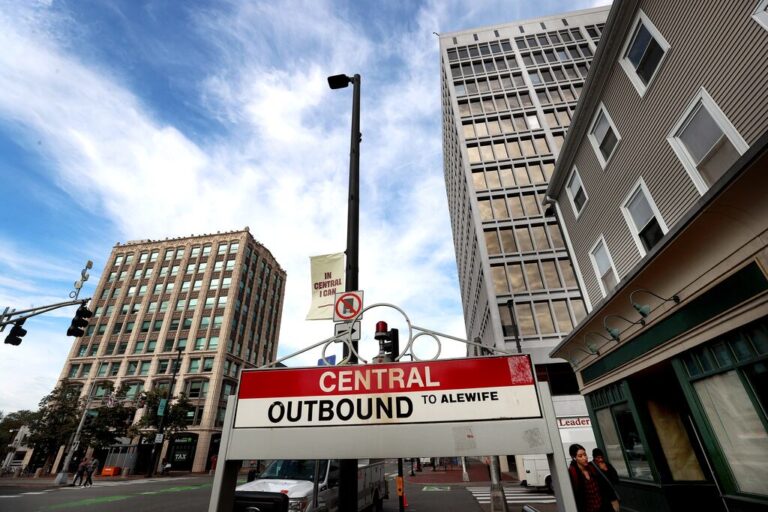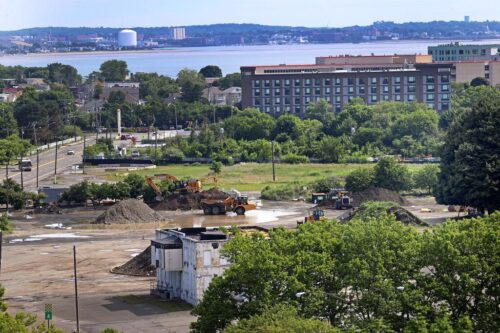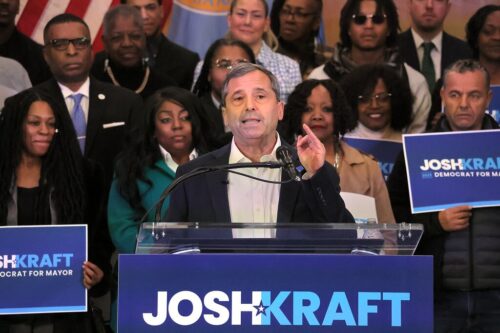The Cambridge City Council on Monday night passed a dramatic overhaul of the city’s land-use rules, broadly allowing buildings up to six stories in neighborhoods across the city.
The plan makes Cambridge one of the first cities in the state to eliminate single-family zoning, meaning there’s no longer anyplace in the city where only single-family homes can be built. That has long been the standard in many communities, but has greatly constricted the construction of housing. That does not mean single-family homes are no longer allowed in those neighborhoods, but rather that something as tall as six stories could be built on nearly any lot.
Under the new policy, any lot in the city, whether it now has a small, pastel-colored row house or sprawling mansion on it, can be redeveloped into a four-story apartment building without needing special city approval. Developers can add an additional two stories by-right if 20 percent of the units in a project are set aside as affordable and the lot meets a minimum size requirement.
Supporters hope the change will generate thousands of new units over the next decade in what is already one of the most densely populated — and most expensive — cities in the country.
“I think that this will be a landmark moment, where the zoning map of Cambridge doesn’t exactly look like a copy . . . of a redlining map, where the [most] affordable housing is not only in areas which also have more people of color and more multifamily housing in general, but our whole city is growing together as one with a unified residential district,” said Councilor Burhan Azeem, who authored the proposal with Councilor Sumbul Siddiqui.
The proposal comes as cities and towns across Eastern Massachusetts are engaged in heated fights over solving a housing shortage that has become the state’s most intractable issue. But most of those debates, taking place in communities with shrinking populations and skyrocketing prices, have been about comparatively modest changes.
‘We love these buildings’: Should developers get to build six stories anywhere in Cambridge?
With Monday’s vote, Cambridge went the opposite direction. While the zoning plan is controversial, particularly among residents of some of the less dense neighborhoods, it represents the most sweeping attempt by a city in Massachusetts to find a solution to the housing problem.
And it also puts Cambridge on the forefront of the national YIMBY — Yes in My Back Yard — movement, which supports looser zoning rules to boost the production of housing. The six-story policy is perhaps the broadest YIMBY policy passed in a US city to date.
The nine-member council approved the plan 8-1 after months of debate, and some councilors who are typically more skeptical of density changes ultimately supported the proposal.
Still, it was not without controversy. Over two hours of public comment Monday night, some residents worried that the proposal was too much, too fast — that it would lead to overcrowding in lower-slung neighborhoods, and promote the development of expensive luxury housing instead of homes that are affordable to residents with lower- and middle-class incomes. Some also complained that the proposal was too simplistic, and that it had come together too quickly.
“I believe this proposal will produce mostly luxury units, raise real estate values, taxes, and rents, displace residents, and raise both physical and psychological havoc in our neighborhoods,” said Catherine Zusy, the lone councilor who voted against the plan. “It is not a recipe for urban planning. It is a recipe for random development at the whim of developers.”
Erin Clark/Globe Staff
The proposal that passed Monday was a slightly reduced compromise of the original plan, which simply would have allowed six stories, by-right, everywhere in Cambridge, meaning projects could be permitted without the special approval of a city board if they meet the zoning parameters, citywide.
But after persistent pushback, including from within the council, Azeem and other supporters negotiated the compromise allowing for four stories by-right citywide, and developers can add two additional stories with conditions.
If the proposal yields significant market-rate housing, it will also bring an influx of new affordable homes to a city where the pace of development of all kinds has been lethargic for years.
In the end, almost every councilor agreed that it was time to get rid of single-family zoning, sometimes referred to as exclusionary zoning, which rose to prominence in the early 20th century as a policy tool for keeping some neighborhoods exclusive along racial boundaries by preventing the construction of apartments.
Six stories is the necessary scale for a city like Cambridge, said Azeem, because there is little open land for new housing. The city is so dense already, he said, that the only way to add housing is to build higher.
By some measures, Cambridge has the worst localized housing crisis in Massachusetts and some of the highest housing costs in the United States. The median rent for a one-bedroom apartment is $2,612 a month, according to rental website Apartment List.
Cambridge has become something of a laboratory for housing reform in recent years. First it passed a landmark policy that allows affordable housing projects to skirt traditional zoning rules. Then in 2023, the council boosted that policy by allowing affordable developments to be as high as 15 stories without needing permission from the local zoning board.
The council also passed a policy that eliminated minimum parking requirements at new buildings. Parking, Azeem and other Cambridge housing advocates argued, dramatically increases the cost of building.
Each of those policies was controversial in their own right, but as the council has continued to push on housing policy, old political lines have begun to fade. That six-story zoning passed with only one opposing vote would have been unthinkable even a couple of years ago. A much lesser multifamily housing plan that was proposed a few years ago never even made it to a vote.
“For too long, exclusionary zoning has put up barriers, barriers that have kept people out, that have restricted growth, that have made it harder for families to put down roots,” Mayor Denise Simmons said ahead of the vote Monday. “And so tonight, we have the chance to take down some of those barriers and make good on the commitment of being a welcoming and accessible city.”
222,000 new homes must be built over the next decade to fix housing shortage, state saysAs Kraft spars with Wu, one thing is for certain: The Boston mayoral race will be about housingNeedham voters just rejected the town’s state-mandated housing plan. Now what?




Comment count: